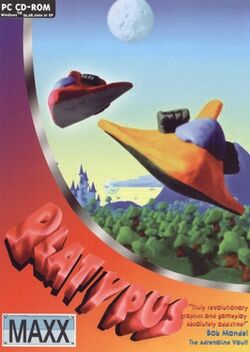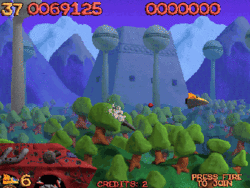Platypus (video game)
Topic: Software
 From HandWiki - Reading time: 5 min
From HandWiki - Reading time: 5 min
| Platypus | |
|---|---|
 | |
| Developer(s) | Squashy Software[lower-alpha 1] |
| Publisher(s) | Idigicon[lower-alpha 2] |
| Producer(s) | George Bray |
| Designer(s) | Anthony Flack |
| Programmer(s) | Michael W. Boeh |
| Composer(s) | Alistair Bowness Chris Abbott Darren Izzard |
| Series | Platypus |
| Platform(s) | |
| Release | |
| Genre(s) | Horizontally scrolling shooter |
| Mode(s) | Single-player, Co-op |
Platypus is a horizontal scrolling shooter game created and designed by Anthony Flack, produced by George Bray, and programmed by Michael W. Boeh. The objective is to guide an antique spacecraft by utilizing the mouse in order to avoid and attempt to shoot enemies.
Gameplay

The player flies an antiquated spacecraft (the last of the fictional F-27 Platypus fleet) and attempts to defend the peaceful country of Mungola from neighboring Colossatropolis, which has become so overcrowded that its inhabitants are taking over Mungola for space and resources. The game consists of four levels, with five areas per level and a strong boss enemy that must be defeated at the end of the fifth area. The player can collect power-ups that affect the type and firing rate of the ship's weapons, equip auxiliary cannons, or double the point values of all enemies and items.
Points are scored for destroying enemies and collecting bonus coins and fruits. In addition, at the end of each area, the player receives bonus points depending on the percentage of primary targets and enemy craft destroyed. One life is lost whenever the player's ship collides with a target or is hit by enemy fire.
At the beginning of the game, the player is given a set number of credits that can be used to continue play if all lives are lost. One bonus credit is awarded for completing each of the first three levels; after the fourth is completed, the player receives a large bonus depending on the number of unused credits.
Production
This section does not cite any external source. HandWiki requires at least one external source. See citing external sources. (August 2022) (Learn how and when to remove this template message) |
All the artwork for the game was created using a process called claymation. Flack has stated that due to limited availability of plasticine in his home country of New Zealand (at the time the game was created), he re-used the same lump of grey clay to create all the models, photographed them with a digital camera, and coloured the images in Adobe Photoshop. The music in Platypus on all platforms (except for the iPhone port) consists of various remixes of Commodore 64 game tunes by various composers, and created by several artists. They originally appeared on CDs from the C64Audio.com label, and were licensed to Idigicon Ltd. by High Technology Publishing Ltd. The current publishers for all composers whose music appeared in the game except Jonathan Dunn who is represented by Bucks Music Publishing Ltd. and who at the time was unpublished. Where possible, full credits appeared in the distributions, albeit in text file form.
As of 2019, Anthony and Claymatic Games bought the license for Platypus, including its sequel.
Releases
Platypus was first released on CD in May 2002.[1] It was modified and distributed online by Retro64 from January 2004 and included an easy mode and mouse support.[2] A third build of the game (which can be distinguished as the score of Player 2 as yellow numbers and not red) included various bug fixes and was used for multiple localizations, including Chinese and Japanese versions. On November 14, 2006, Platypus saw a release for Sony's PlayStation Portable console.[3] On March 26, 2009, it became available for download on the PlayStation Network.[4] The game functions the same as its full PC downloadable version, but with minor changes for the PSP version, like the new screen size. On November 24, 2009, Platypus was released on Xbox Live Indie Games. On August 15, 2014, Platypus and Platypus II, were both released on Steam.[5]
Reception
| Reception | ||||||||||||||||||||||||||||||||
|---|---|---|---|---|---|---|---|---|---|---|---|---|---|---|---|---|---|---|---|---|---|---|---|---|---|---|---|---|---|---|---|---|
| ||||||||||||||||||||||||||||||||
Platypus was met with positive reception from critics.
Sequel
In February 2007, Idigicon released Platypus II, developed by Citric Games without the involvement of the original developer.[2]
Notes
- ↑ Ported to mobile devices by BitRabbit, PSP by MumboJumbo, Xbox 360 by Escapist Games
- ↑ Windows version was published digitally by Retro64 and KISS Ltd., mobile ports were published by Handmark, PSP port was published by MumboJumbo, Xbox 360 port was published by Escapist Games
References
- ↑ "Platypus (Game)". Giant Bomb. http://www.giantbomb.com/platypus/3030-7829/.
- ↑ 2.0 2.1 "Platypus". MobyGames. http://www.mobygames.com/game/windows/platypus.
- ↑ "Platypus Releases". MobyGames. http://www.mobygames.com/game/platypus/release-info.
- ↑ 4.0 4.1 "Platypus :: PSP Game Review". Kidzworld. April 1, 2009. https://www.kidzworld.com/article/16918-platypus-psp-game-review.
- ↑ "Platypus". Steam Spy. https://steamspy.com/app/307340.
- ↑ "Platypus for PSP Reviews". Metacritic. CBS Interactive. November 17, 2006. https://www.metacritic.com/game/platypus/critic-reviews/?platform=psp.
- ↑ Kasavin, Greg (November 1, 2005). "Platypus Review - If you're a fan of the side-scrolling shoot-'em-ups that were popular in arcades and on video game consoles throughout the '80s and '90s, Platypus will be a real treat". GameSpot. CBS Interactive. https://www.gamespot.com/reviews/platypus-review/1900-6158750/.
- ↑ Calvert, Justin (December 18, 2006). "Platypus Review - Platypus is a simplistic, short-lived shoot-'em-up with visuals and gameplay that are adequate rather than impressive". GameSpot. CBS Interactive. https://www.gamespot.com/reviews/platypus-review/1900-6163349/.
- ↑ Kemps, Heidi (January 3, 2007). "Platypus (PSP) - An odd duck indeed". GameSpy. IGN. http://psp.gamespy.com/playstation-portable/platypus/753013p1.html.
- ↑ Lewis, Ed (December 7, 2006). "Platypus Review - Goofy graphics get wrapped around a generic and lifeless shooter". IGN. Ziff Davis. https://www.ign.com/articles/2006/12/07/platypus-review.
- ↑ Andrew, Keith (December 11, 2008). "Game Review: Platypus (iPhone)". Pocket Gamer. Steel Media Ltd.. https://www.pocketgamer.com/articles/010444/platypus/.
- ↑ D'Aprile, Jason (February 8, 2007). "X-Play Review: Platypus (Sony PSP)". X-Play. G4 Media. http://www.g4tv.com/xplay/reviews/1398/Platypus.html.
- ↑ Brasier, Jason (June 2, 2008). "Télécharger Platypus Game (Mac) - Un peu d'agressivité dans un monde de pâte à modeler !" (in fr). Clubic. Clubic SAS. http://www.clubic.com/telecharger-fiche244960-platypus-game.html.
- ↑ Boutilier, Christian (December 18, 2006). "Platypus PSP Review". Extreme Gamer. Christian Boutilier. http://www.extremegamer.ca/psp/reviews/platypus.php.
- ↑ Carroll, Russell (February 6, 2004). "Act: Platypus [by Retro64 - Mini Review: Platypus"]. Game Tunnel. Russell Carroll. http://www.gametunnel.com/html/reviews2-39.html.
- ↑ Spitalieri, Mike (January 5, 2009). "iPhone - Platypus". MacLife. Future US. http://www.maclife.com/article/iphone/platypus.
- ↑ Podolsky, Andrew (June 11, 2009). "Platypus Review". Slide To Play. Slide To Play, Inc.. http://www.slidetoplay.com/story/platypus-review.
External links
 |
 KSF
KSF